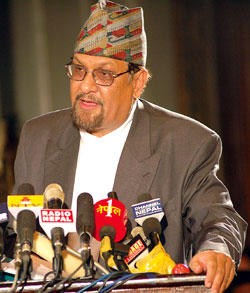|
|
A budget that pleases all constituencies is a rare phenomenon. And pundits will tell you, like they told you last year and the year before, that this is a good budget if it can be implemented properly.
But implementation is doubly difficult this year. First, it is not clear that the ceasefire and the ongoing efforts to mainstream the Maoists are helping mitigate the difficulties of getting projects on the ground.
Secondly, even if one is to assume that Maoists behave (gleeful recipients of half of the doubled VDC grants, perhaps?) it is very likely that there will be too little money chasing too many projects unless all of the projected increase in foreign aid not only materialises but does so in the form of quick-disbursing budget support in cash.
In the euphoric four years following the 1990 movement, which presumably got the donors more excited than they are today, foreign aid grew at a modest average of 16 percent per year. The finance minister is projecting a 76 percent growth in foreign aid in this budget.
Is this a realistic expectation? We will not know until next year. But what we do know already is that Ram Sharan Mahat will probably not be around in the same capacity next year to share a critical appraisal on the performance of his budget. This is obviously an upshot of the political turbulence that has characterised this period but also reflects the culture of severe non-accountability that a short-horizon nature of governments has engendered.
In such an environment, there is little incentive to learn from past experience, let alone build on the progress of the predecessor. Every new budget ends up reinventing the wheel and offering programs and projects that are rehashed, recycled, reproduced and most likely based on economics that is outdated.
Take the case of the proposal to build a Special Economic Zone. The idea made its debut in a budget speech as early as at least 2000/01 when Mahesh Acharya earmarked Rs 60 million for the establishment of these facilities in three locations: Bhairawa, Birganj and Biratnagar. In 2001/02 Ram Sharan Mahat gave continuity to this effort by allotting an additional Rs 60 million for the same project in the three locations. The only budget speech Deuba ever made, in 2002/03, promised another Rs 30 million for the establishment of this facility in Bhairawa (for some reason, the two others were dropped that year).
Obviously dissatisfied with the progress on this front, the Lohani budget of 2003/04 allocated another Rs 42.5 million for the 'speedy completion' of the SEZ. In 2004/05, Madhukar SJB Rana's budget did not make any monetary allocation for this cause but chose to keep the discerning historian interested by clarifying that "a downward adjustment in the present income tax rates" would be made in these special zones.
This year's budget offers a far more elaborate tax relief package that includes customs and VAT exemptions on import of raw materials augmented by a Special Economic Zone Act that will codify a schedule of income tax exemption for industries set up in these zones. All this is only after the 'Special Economic Zone under construction in Bhairawa . [comes] into operation in the next fiscal year'.
At least six years have elapsed and Rs 2 billion spent since its budgetary debut.Yet, even Bhairawa among the three facilities that were initially supposed to be built simultaneously is still under construction. How long does it take to construct these facilities? How much does it cost? What are the factors that have caused the delay in the construction? Why is a feasibility study still being conducted for a project that was already initiated, budgeted for, and presumably expensed for at least two consecutive years five years ago? Neither the budget speech nor the accompanying economic survey has answers.
Part of the blame lies with us, the so-called 'analysts', who are often more interested in what exciting things the new guy has to offer than lessons from the failure of the person before him. Until appropriate mechanisms to incorporate historical learning into the budget-making process are institutionalised, the elusive 'implementation difficulties' will remain convenient excuses for non-performance.
We may not be able to change incentives and get finance ministers to take a long view on things without broader political reforms but we can certainly pressure them to defend the bearings of their projects, plans and programs in the context of earlier efforts on the same front. For now, we can all start by monitoring the progress this government makes on the two promises made on the Special Economic Zone front this year.
The SEZ saga
Since 2001, Rs2 billion has been set aside for Special Economic Zones in Bhairawa, Birganj and Biratnagar that were never built. This year's budget promises to reduce taxes on imported raw materials at SEZs that have yet to be completed. A glimpse at past budgets:
| Fiscal Year | Finance Minister | Amount (in millions) |
| 2000/01 | Mahesh Acharya | Rs 60 |
| 2001/02 | Ram Sharan Mahat | Rs 60 |
| 2002/03 | Sher Bahadur Deuba | Rs 30 |
| 2003/04 | Prakash C Lohani | Rs 42.5 |



